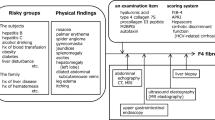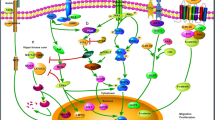Abstract
Primary liver cancer, 95% of which is hepatocellular carcinoma (HCC), is ranked third in men and fifth in women as a cause of death from malignant neoplasms in Japan. The number of deaths and death rate of HCC began to increase sharply in 1975. These numbers peaked at 34 510 and 27.4/100 000, respectively, in 2004, but decreased to 33 662 annual deaths and a 26.7/100 000 death rate in 2006. Although hepatitis B virus (HBV) and hepatitis C virus (HCV) infection are both major causes of HCC, HCV-related HCC represents 70% of all cases. The incidence of HCC without hepatitis B surface antigen (HBsAg) or antibodies to HCV (anti-HCV) accounts for 8%–15% of HCC patients nationwide. Geographically, HCC is more frequent in western than eastern Japan, and death rates of HCC in each prefecture correlate with anti-HCV, but not HBsAg, prevalence. Interferon therapy for chronic hepatitis C reduces the risk of development of HCC, especially among patients with sustained virological response. Further research should focus on the mechanisms of carcinogenesis by HCV and HBV, development of more effective treatments, and establishment of early detection and preventative approaches. Better understanding of HCC unrelated to HCV and HBV, possibly caused by steatohepatitis and diabetes, should also be a major concern in future studies.
Similar content being viewed by others
References
Ikai I, Arii S, Okazaki M, Okita K, Omata M, Kojiro M, Takayasu K, et al. Report of the 17th Nationwide Follow-up Survey of Primary Liver Cancer in Japan. Hepatol Res 2007;37:676–691.
Kiyosawa K, Umemura T, Ichijo T, Matsumoto A, Yoshizawa K, Gad A, Tanaka E. Hepatocellular carcinoma: recent trends in Japan. Gastroenterology 2004;127:S17–S26.
Umemura T, Kiyosawa K. Epidemiology of hepatocellular carcinoma in Japan. Hepatol Res 2007;37(suppl 2):S95–S100.
Japan LCSGi. Survey and follow-up study of primary liver cancer in Japan. Report 11. Kanzo 1995;36:208–218.
Japan LCSGi. Survey and follow-up study of primary liver cancer in Japan. Report 12. Kanzo 1997;38:317–330.
Japan LCSGi. Survey and follow-up study of primary liver cancer in Japan. Report 13. Kanzo 1999;40:288–300.
Japan LCSGi. Survey and follow-up study of primary liver cancer in Japan. Report 14. Kanzo 2000;41:799–811.
Japan LCSGi. Survey and follow-up study of primary liver cancer in Japan. Report 15. Kanzo 2003;44:157–175.
Ikai I, Arii S, Ichida T, Okita K, Omata M, Kojiro M, Takayasu K, et al. Report of the 16th follow-up survey of primary liver cancer. Hepatol Res 2005;32:163–172.
Orito E, Sugauchi F, Tanaka Y, Ichida T, Sata M, Tanaka E, Okanoue T, et al. Differences of hepatocellular carcinoma patients with hepatitis B virus genotypes of Ba, Bj or C in Japan. Intervirology 2005;48:239–245.
Sumi H, Yokosuka O, Seki N, Arai M, Imazeki F, Kurihara T, Kanda T, et al. Influence of hepatitis B virus genotypes on the progression of chronic type B liver disease. Hepatology 2003;37:19–26.
Kasahara A, Hayashi N, Mochizuki K, Takayanagi M, Yoshioka K, Kakumu S, Iijima A, et al. Risk factors for hepatocellular carcinoma and its incidence after interferon treatment in patients with chronic hepatitis C. Osaka Liver Disease Study Group. Hepatology 1998;27:1394–1402.
Imai Y, Kawata S, Tamura S, Yabuuchi I, Noda S, Inada M, Maeda Y, et al. Relation of interferon therapy and hepatocellular carcinoma in patients with chronic hepatitis C. Osaka Hepatocellular Carcinoma Prevention Study Group. Ann Intern Med 1998;129:94–99.
Ikeda K, Saitoh S, Arase Y, Chayama K, Suzuki Y, Kobayashi M, Tsubota A, et al. Effect of interferon therapy on hepatocellular carcinogenesis in patients with chronic hepatitis type C: a long-term observation study of 1,643 patients using statistical bias correction with proportional hazard analysis. Hepatology 1999;29:1124–1130.
Yoshida H, Tateishi R, Arakawa Y, Sata M, Fujiyama S, Nishiguchi S, Ishibashi H, et al. Benefit of interferon therapy in hepatocellular carcinoma prevention for individual patients with chronic hepatitis C. Gut 2004;53:425–430.
Okanoue T, Minami M, Makiyama A, Sumida Y, Yasui K, Itoh Y. Natural course of asymptomatic hepatitis C virus-infected patients and hepatocellular carcinoma after interferon therapy. Clin Gastroenterol Hepatol 2005;3:S89–S91.
Ikeda K, Marusawa H, Osaki Y, Nakamura T, Kitajima N, Yamashita Y, Kudo M, et al. Antibody to hepatitis B core antigen and risk for hepatitis C-related hepatocellular carcinoma: a prospective study. Ann Intern Med 2007;146:649–656.
Author information
Authors and Affiliations
Rights and permissions
About this article
Cite this article
Umemura, T., Ichijo, T., Yoshizawa, K. et al. Epidemiology of hepatocellular carcinoma in Japan. J Gastroenterol 44 (Suppl 19), 102–107 (2009). https://doi.org/10.1007/s00535-008-2251-0
Received:
Accepted:
Published:
Issue Date:
DOI: https://doi.org/10.1007/s00535-008-2251-0




